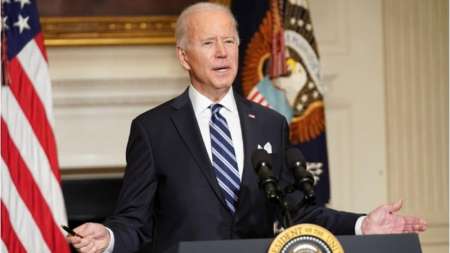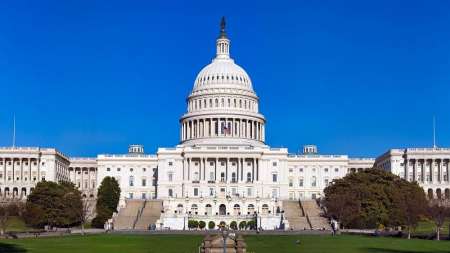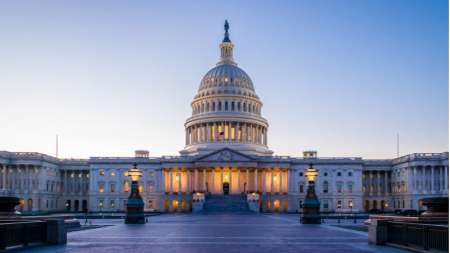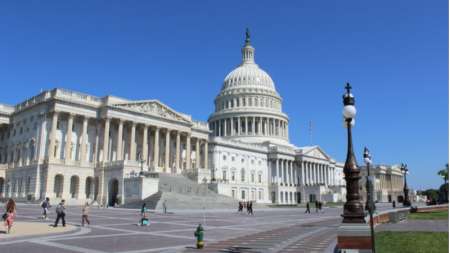Senate Majority Leader Chuck Schumer, D-N.Y., today pledged to waste little time in Senate consideration of the Fiscal Responsibility Act of 2023 bill approved by the House on Wednesday evening. […]
Department of Commerce (DoC) Secretary Gina Raimondo warned members of Congress this week that proposals by House Republicans to cut funding to fiscal year 2022 levels would be a “huge step backward” to U.S. national security, as well as creating a “dangerous” hit to U.S. technological leadership. […]
President Biden’s proposed $842 billion fiscal year (FY) 2024 budget request for the Department of Defense (DoD) includes the largest-ever research, development, test, and evaluation (RDT&E) funding at $145 billion, and $13.5 billion for cyberspace-related activity. […]
The Biden administration’s proposed $859 million fiscal year 2024 budget for the Government Accountability Office (GAO) will help the agency to maximize its science, technology, and cybersecurity reporting capabilities to meet Congress’s growing demand for those services, GAO’s top official told lawmakers at a Senate Legislative Branch Subcommittee hearing on March 15. […]
The Biden administration’s fiscal year (FY) 2024 budget request includes a total of $74 billion of IT spending for Federal civilian agencies and $12.7 billion for cybersecurity spending, according to a budget appendix released by the White House on March 13. […]
The Biden administration’s fiscal year (FY) 2024 budget request issued today by the White House features a proposed $200 million addition to the Technology Modernization Fund (TMF), and a 4.9 percent annual budget increase for the Cybersecurity and Infrastructure Security Agency (CISA). […]
President Biden’s budget request for fiscal year (FY) 2024 released today aims to strengthen U.S. leadership in emerging technologies by offering $25 billion for CHIPS and Science Act authorized activities – an increase of about $6.5 billion from the 2023 enacted level. […]
President Biden has proposed more than $500 million of spening to improve customer experience across the Federal government in his fiscal year (FY) 2024 budget plan released today. […]
IT modernization can feel like a never-ending process for Federal agencies, especially with new technologies emerging every day. However, having a modernization budget can help organizations ease those day-to-day hassles and stay ahead of the curve. […]
The Senate today voted to approve a full-year fiscal year (FY) 2023 funding bill that will keep the Federal government running until Sept. 30, 2023. […]
TikTok is one of the fastest-growing social media apps in the world, sucking users into its irresistible, infinitely looping feed of videos personally curated to their interests. However, Federal employees may now need to wait until they get home to watch the app’s latest dance craze or viral pasta recipe. […]
The House and Senate Appropriations committees today unveiled a $1.7 trillion spending bill that would fund Federal government operations for the remainder of Fiscal Year (FY) 2023 that ends next September 30. […]
President Biden today signed into law a short-term continuing resolution (CR) budget measure that will fund Federal government operations at Fiscal Year 2022 levels through Dec. 23. Government funding under a previous CR signed in September had been set to run out at midnight tonight. […]
Republican and Democratic leaders of the House and Senate Appropriations committees said late Tuesday night that they have reached a “framework agreement” on Fiscal Year 2023 appropriations that they hope will lead to final spending bills to fund Federal government operation through September 2023. […]
The Social Security Administration (SSA) said in a blog post that the agency will be “forced” to cut funding for its information technology (IT) investments if Congress ends up allotting the agency a significantly smaller budget than the White House requested for fiscal year (FY) 2023. […]
Sens. Jack Reed, D-R.I., and Jim Inhofe, R-Okla., formally opened deliberation for the Fiscal Year (FY) 2023 National Defense Authorization Act (NDAA) on the Senate floor on Tuesday. However, a final vote on the bill is unlikely to occur until after the midterms. […]
The House today voted to approve continuing resolution legislation that will fund the Federal government – mostly at fiscal year 2022 spending levels – until December 16. The House approved the bill by a vote of 230-201, with ten Republicans voting for the measure. […]
As Congress and the Biden administration have yet to pass a budget deal for fiscal year (FY) 2023, the White House’s Office of Management and Budget (OMB) is asking Congress to pass a $47.1 billion continuing resolution (CR) funding bill before the current fiscal year ends on September 30. […]
The fiscal year (FY) 2023 National Defense Authorization Act (NDAA) approved by the House late on July 14 by a vote of 329-101 picked up hundreds of other bills along the way as approved amendments, including numerous government tech-related legislative items ranging from long-sought Federal Risk and Authorization Management Program (FedRAMP) enhancements to a bill that would wrap Federal agency CIOs more tightly into agency planning processes. […]
The House Appropriations Committee voted on June 22 to approve its fiscal year 2023 defense funding bill which totals $761 billion, up $32 billion – or about four percent – from the FY2022 level. […]
The Senate Armed Services Committee on June 16 completed its markup of the fiscal year 2023 National Defense Authorization Act (NDAA) and voted 23-3 to send the spending bill to the full Senate for consideration. […]
President Biden’s fiscal year (FY) 2023 proposed budget includes a proposed increase in Federal spending on research and development (R&D) to $86 billion, up from the estimated $79.7 billion from FY2022. […]
The Department of Defense (DoD) would refill its coffers for cyber investments with $11.2 billion in funding for cyberspace activities under the White House’s budget request for fiscal year (FY) 2023 – which proposes to hike DoD’s cybersecurity-related funding by nearly $1 billion from the prior-year request. […]
Congressional attention is turning over the next three weeks to negotiating and approving full-year Fiscal Year 2022 (ending Sept. 30) appropriations legislation after the Senate on Feb. 17 voted to approve a continuing resolution (CR) funding bill to keep government operations funded until March 11. […]
Senate Majority Leader Chuck Schumer, D-N.Y., filed cloture on the latest House-passed continuing resolution (CR) – which would extend Federal government funding through March 11 – setting up a timeline for a Senate vote on the funding bill by Friday. […]
Leaders of the House and Senate Appropriations Committees said they have reached a bicameral, bipartisan agreement on a framework for full fiscal year (FY) 2022 appropriations bills that would fund Federal government operations through the end of the current fiscal year that ends Sept. 30. […]
House and Senate leaders are steering toward another stopgap continuing resolution (CR) funding bill to avoid a Federal government shutdown when the current CR approved in December 2021 expires on Feb. 18. […]
Legislative crunch-time for the Biden administration’s two infrastructure funding bills began in earnest on Monday. Here are three tracks to watch that impact the legislation, which proposes billions of dollars of funding for Federal IT, cybersecurity, and broadband initiatives. […]
The Department of Defense (DoD) has practices in place to minimize the effects of funding that comes from a continuing resolution (CR), the Government Accountability Office (GAO) found, due to the agency starting 11 of the last 12 fiscal years under a CR. […]
Crumbling bridges and leaky levees. Buckling roadways. Unsafe water pipes. Inadequate public transit. The list of U.S. infrastructure failings is both broad and deep. The United States is paying only about half of its necessary infrastructure bill, and the total investment gap has grown from $2.1 trillion over 10 years, to a current figure of nearly $2.59 trillion over 10 years, according to the American Society of Civil Engineers. As a result, local government leaders face staggering infrastructure requirements that local tax revenues cannot fulfill. […]














